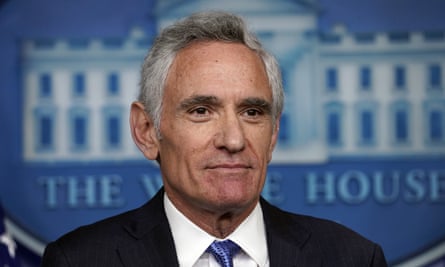Neuroradiologist who has no expertise in infectious diseases downplayed the threat of coronavirus

First published on Mon 30 Nov 2020 20.02 EST
Scott Atlas has resigned as special adviser to Donald Trump, a White House official said on Monday, after a controversial four months during which he attacked science-based public health measures and clashed repeatedly with other members of the coronavirus taskforce.
“I am writing to resign from my position as Special Advisor to the President of the United States,” Atlas said in a letter to Trump dated 1 December, according to Fox News, which first reported his resignation. Atlas later confirmed his resignation in a tweet.
Atlas is a neuroradiologist and fellow at Stanford’s rightwing Hoover Institution, where he works on healthcare policy. He has no expertise or experience in infectious diseases or epidemiology, yet was nevertheless selected by Trump to advise the president on the pandemic.
Atlas joined the White House this summer, where he clashed with top government scientists, including Dr. Anthony Fauci and Dr Deborah Birx, as he resisted stronger efforts to contain the pandemic.
Atlas attacked public health measures such as masks, stay-at-home orders and social distancing. He called on residents of Michigan to “rise up” against restrictions put in place by Governor Gretchen Whitmer, who had been the target of a kidnapping plot, leading to calls for his firing.
Atlas repeatedly downplayed the threat of the virus, which has killed more than 265,000 Americans.
He also promoted the idea that the US should aim to achieve “herd immunity”, a so-called strategy that would probably result in millions of deaths, and was repeatedly rebuked by public health and infectious disease experts, in addition to Stanford University and the Stanford faculty senate.
His views also prompted Stanford to issue a statement distancing itself from the faculty member, saying Atlas “has expressed views that are inconsistent with the university’s approach in response to the pandemic”.
“We support using masks, social distancing, and conducting surveillance and diagnostic testing,” the university said on 16 November. “We also believe in the importance of strictly following the guidance of local and state health authorities.”
Atlas has been sharply criticized by public health experts, including Fauci, the leading US infectious disease expert, for providing Trump with misleading or incorrect information on the virus pandemic. He has downplayed the importance of face masks and this month said lockdowns had been “an epic failure” in stopping the virus’s spread.
Atlas defended his role in his resignation letter, saying, “I cannot think of a time where safeguarding science and the scientific debate is more urgent.”
The resignation comes as the country faces a deadly surge in coronavirus cases and record-high hospitalisations. The US is currently reporting more than 100,000 new coronavirus cases a day.
Dr Celine Grounder, a member of Biden’s advisory panel on the crisis, greeted the news of the resignation with relief.
“I’m relieved that in the future, people who are qualified, people who are infectious disease specialists and epidemiologists like me will be helping to lead this effort,” she told CNBC.
“You wouldn’t go to a podiatrist for a heart attack and that was essentially what was happening.”
Atlas was hired as a “special government employee”, which limited his service to government to 130 days in a calendar year, a deadline he reached this week.
